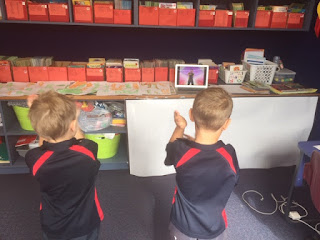The main focus was examining anxiety and how this effects children and their families. Karen has written two books to help spark discussion for young people. I have been utilising them in class to help students to talk about and 'normalise' anxiety.
In Aroha Pod we have read both Hey Warrior and Hey Awesome. The students have started to have discussions about what anxiety is and how it makes them feel. Having a character and those feelings described in a relatable way helps our tamariki to start those conversations and see that everyone at times feels anxious.
 |
| How we feel when we are anxious and what we can do about it. |
 |
| How we feel when we are anxious and what we can do about it. |
We have also looked at how anxiety makes us feel and the strategies we can take to help ourselves. Talking openly with family, friends and classmates can really make a difference in our students wellbeing and hauora.
Ngā Mihi,
Bex










